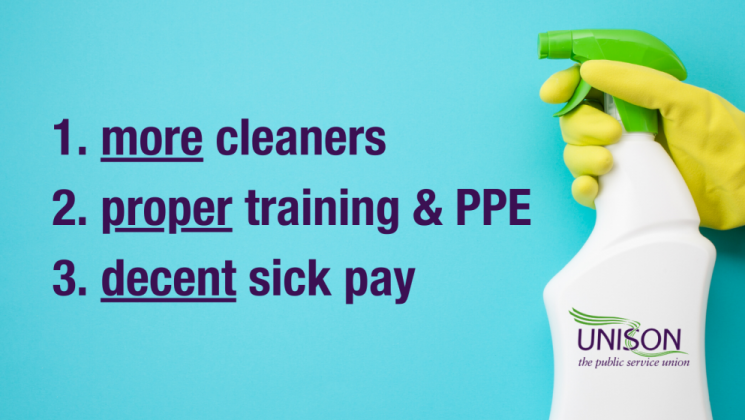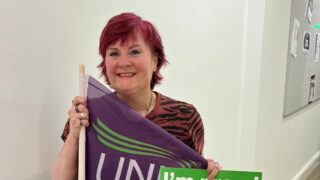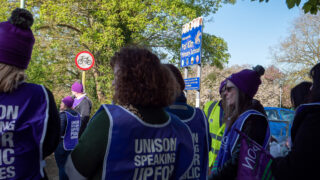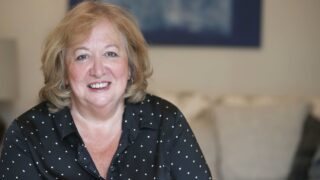Some cleaners in schools in eastern England are still having to work without protective kit and not given the ‘deep-clean’ training needed to keep people safe, says a survey published today by UNISON.
The union is calling on the government to provide schools with money to hire extra cleaners. Figures released by UNISON show that more than a quarter (26%) of staff say there has been no increase in cleaning services since many schools reopened at the start of June.
The survey was based on responses from more than 500 employees working in primary, nursery and special schools in the East of England. UNISON says the findings are concerning, given schools are preparing to reopen fully in September.
Instead of specialist ‘deep-clean’ teams, regular cleaning staff are expected to carry out this potentially hazardous work, according to half (50%) of school workers.
A fifth (17%) who took part in the survey said cleaners at their school had no access to the appropriate personal protective equipment (PPE).
Government guidance states that more rigorous and regular cleansing of classrooms, washrooms and items touched regularly, such as chairs, should be undertaken to limit the infection risk from coronavirus.
UNISON says there is an urgent need for cleaners to be specially trained in how to disinfect buildings properly and handle potentially harmful cleaning materials correctly.
Without it, premises might not meet safety standards and staff could be put in danger if asked to use products without knowing the hazards, says the union.
Of the survey respondents who said regular cleaning staff were doing deep cleans, a quarter (25%) said these workers had not received specialist training on handling hazardous substances* and nearly a fifth (17%) said they had not been risk assessed.
Many schools have not hired more cleaners despite the extra demands created by Covid-19 , says UNISON. This means other employees such as teaching assistants are having to help clean toilets and sanitise toys, according to the survey.
Four in five (81%) of those questioned said non-cleaning staff at their school were being asked to clean classrooms and items such as chairs and books. This is time that should be spent helping pupils, says UNISON.
Many school cleaners are employed by private firms, often paying only the minimum wage and statutory sick pay. This can lead to staff continuing to work when ill for fear of financial hardship, says UNISON.
The government must find more money for training school cleaners and increasing their numbers, the union says.
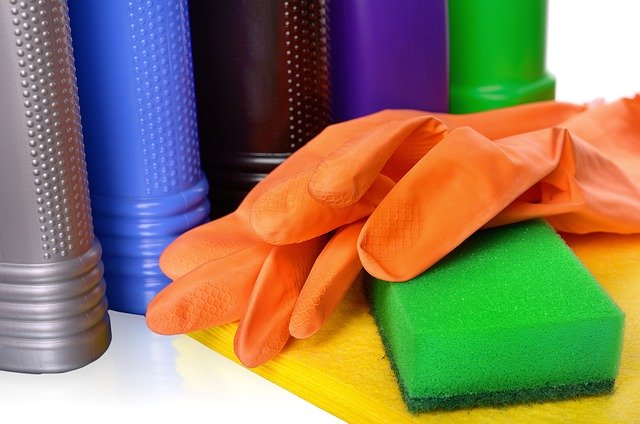
UNISON Eastern schools lead Tracey Sparkes said: “Cleaning a school properly is a specialist job, yet the workers doing this are often overlooked, underpaid and haven’t been trained for the extra demands.
“Lots more cleaners are needed. Other staff shouldn’t be expected to step in to help out. Teaching assistants are stretched enough as it is. They should be focusing on supporting pupils, not standing in for cleaners.
“Everyone wants to see children back in the classroom, but this must be done safely. Given the extra cleaning needed, the government must give schools the money to employ cleaners with the necessary training and protective kit to keep the whole school safe.”
Sue Mead (not her real name), who works as a cleaner in a primary school in Bedfordshire, said: “We’re two cleaners down as they’re shielding. It’s unlikely the school will recruit more cleaning staff for September – they and the local authority don’t have the money.”
Other cleaners said:
- “The teaching staff are cleaning the desks during the day and the midday supervisory assistants are coming in to empty bins and clean toilets at lunchtime.”
- “We’ve been scrubbing floors, walls and deep cleaning, even though we’re not deep cleaning specialists.”
- “Out of four cleaners, only two have been at work. The workload has trebled and now we have to split our shifts to ensure a cleaner is on site all day.”
- “Due to the sheer quantity being used, I’m struggling to replace hand soap. I’ve never run out before in my career as a cleaning supervisor. It’s physically and emotionally demanding.”
UNISON has launched a Clean schools, safer schools campaign to protect pupils, staff, parents and the wider community when schools reopen in September.
We want more cleaners, proper training and PPE, and decent sick pay.

